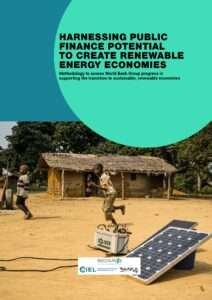
The World Bank Group (WBG) has financed and incentivized up to $165 billion in fossil fuel investments since the Paris Agreement was signed. However, a combination of global scientific consensus and international political agreements now requires the WBG to set an example for both public and private financial institutions by supporting the rapid transition to a renewable energy economy.
Harnessing Public Finance Potential to Create Renewable Energy Economies, a report jointly published by CIEL, Recourse, and TrendAsia, urges the WBG to shift its financing policy and practice from fossil fuel investments towards supporting renewable energy economies, in line with both global climate objectives and social and human rights safeguards.
In the context of climate change, the report reiterates how critical it is for countries to set a clear and rapid pathway for transition to a sustainable renewable energy future. This will require a combination of short-term investment to meet the current needs to deliver 2030 targets, while planning for investment in long-term deep decarbonization of the economy over the following decades.
This report sets out a rights-based methodology for the WBG to align its investments, policy advice, and capacity building with the Paris Agreement, to lead the way on investing in a thriving renewable economy for the countries it invests in. This methodology has been developed to support civil society in holding the WBG to account to deliver a sustainable renewable energy economy that provides energy for all.
The methodology is presented in three sections:
- Section 1: Trajectories for 1.5°C — delivering Paris alignment
- Section 2: Taxonomy with social and environmental accountability: definitions for zero carbon, renewable economies
- Section 3: Delivering ‘whole economy’ just transition across all WBG investments and advice
The approach aims to ensure that:
- The World Bank aligns its investment, policy advice, and capacity building with the Paris agreement to tackle climate change effectively.
- The answer is a fully sustainable, renewable energy-powered economy. There is no room for fossil fuels (fossil gas, oil, coal) or false solutions — such as carbon capture, use, and storage (CCUS); blue hydrogen; nuclear; or large hydro — if we are to keep global temperature rise within the 1.5°C trajectory.
- The energy transition should happen in a way that does not further place the burden and cost of the transition on communities who have done the least to cause climate change, including women and Indigenous Peoples.
Read the report.
Read the executive summary.
Published on March 20th, 2023
